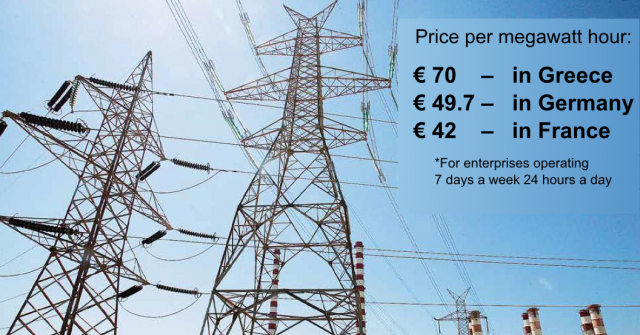"Much Ado about Nothing", this is how representatives of industrial enterprises define the attempt of the Public Power Corporation to reduce the energy costs of the consumers of high and medium voltage electric power through the issuance of new, lower bills. They do not hesitate to describe as a "communicative trick" and even as "pure mockery" the recent initiative of the Public Power Corporation to offer 15 new types of bills, namely 7 for high voltage electric power and 8 for medium, on the basis of which it has invited its customers to sign new contracts valid until 31 December 2014.
"Following the announcement of the Public Power Corporation, our lenders, suppliers and employees have been left with the incorrect impression that the firms will pay for cheaper electricity and will be able to take a breath. Actually, the only benefits are some minor improvements in the bills of some major consumers of medium voltage electric power but they are like a drop in the ocean since, for 62 companies in total consuming medium voltage electric power, the annual benefit is estimated at 12 million euro. At the same time, the risk of significant increases due to the payments for greenhouse gas emissions remains. In the group of the consumers of high voltage electric power, 15 companies, which are customers of the Public Power Corporation, are facing potential increases of up to 1%", state representatives of the Association of Industrial Energy Consumers. They are accusing the Public Power Corporation of announcing the new bills without negotiating them.
"Over the past four years, the energy costs of the holding have increased by 45% and now, with the new bills, the prices will drop only by 5% -10%. Energy costs represent 50% of the total cost and the factories remain open thanks to the sacrifices of the workers whose wages have been substantially reduced. There is no development without industry and open factories", says Apostolos Dondas, a board member of the textile factory "Epilektos", which is one of the biggest consumers of medium voltage electric power.
Konstantinos Katsaros, Chief Executive Officer of ELBAL, part of the "Viohalko" group, explains how the Greek enterprises have lost their competitiveness in recent years, "In Greece, the price per megawatt hour is 70 euro whereas it is 49.7 euro in Germany and 42 euro in France. Similarly, we are paying for natural gas 30% more than the Germans, 28% more than the French and 100% more than the British."

In Greece, the price of high voltage electric power was liberalized in 2008 and the Public Power Corporation had immediately increased it by 10% without consultation with its customers, as required by the Greek regulatory authority RAE. The same thing happened when the market of medium voltage electricity was liberalized in February 2008 since the company increased the prices by 20%.
According to the business, however, "not only the Public Power Corporation is to blame for the extremely high price we are paying".
A number of taxes have been imposed on the already increased electricity prices since 2010 to fill the gap in the budget and the deficit in the energy system.
In particular, high voltage electric power is paying a special consumption tax of 2.5 euro, a fee for renewable energy sources of 3.5 euro, a carbon dioxide fee of 3.5 euro and a utility fee of 4 euro. The charges of the medium voltage electric power are twofold - the special tax amounts to 5 euro, the renewable energy sources fee is 8 euro, the carbon dioxide fee 5 and the utility fee is 7,5 euro.
A survey by the Association of Industrial Energy Consumers shows that the annual profit of the state from these special taxes amounts to 50-60 million euro.
Against this amount, combined with the high prices of the Public Power Corporation, the heavy industry in Greece is losing its competitiveness and reducing its productivity; it is cutting salaries and dismissing workers.
The response of the Public Power Corporation
The press service of the Public Power Corporation has immediately responded to the allegations of the Association of Industrial Energy Consumers. The company claims that the new bills are the result of negotiations and reiterates that the reduction in the prices of medium voltage electric power is significant.
In particular, the message reads:
"In connection with the communication of the Association of Industrial Energy Consumers on the new lower bills of medium and high voltage electric power offered by the Public Power Corporation, we would like to emphasize and remind that:
· The total cost of electricity is formed by the (competitive) prices determined by the Public Power Corporation and by the prices regulated by the state, as well as by taxes and fees.
· The new prices have been formed after repeated negotiations aiming to reflect the needs of different industries.
· As soon as conditions have allowed this, the Public Power Corporation has proceeded to offer new lower prices, which are retrospectively effective as of 1 January 2013.
· It should be noted that the free quotas for greenhouse gases have been cancelled as of 1 January 2013 and, in accordance with Directive 2009/29/EC of the European Union, they are already paid in full and the resulting value should be entirely transferred on electricity prices.
· The calculation of the value of greenhouse gases includes not only the electric power produced by the Public Power Corporation but also the energy produced by third parties from renewable energy sources and by natural gas plants, which the Public Power Corporation is buying.